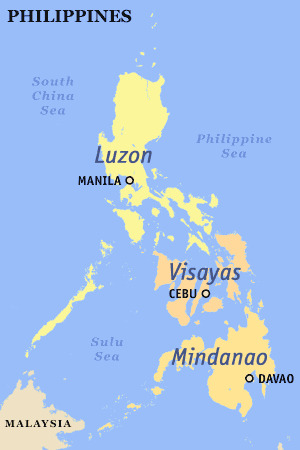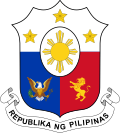Federalism in the Philippines

Federalism in the Philippines (Filipino: Pederalismo sa Pilipinas) refers to political movements in the Philippines that are variants of federalism. Federalism has grown in popularity among Filipinos in recent decades, with multiple political candidates successfully campaigning on federalism-based platforms. In 2022, Bongbong Marcos won the Philippine presidential election as a member of the pro-federalist Partido Federal ng Pilipinas political party (English: Federal Party of the Philippines; abbr. PFP).
History
 |
|---|
|
|
The concept of a federal government for the Philippines was first suggested by
In 1899, Filipino revolutionaries Emilio Aguinaldo and Apolinario Mabini also suggested dividing the islands into three federal states.[2] The Federal State of the Visayas was established as a proposed administrative unit under a federal form of government but was abolished a year later by Aguinaldo's central government in Malolos.
One of the first proponents of federalism in the Philippines in the 21st century is professor Jose Abueva from the University of the Philippines who argued that a federal form of government is necessary to more efficiently cater to the needs of the country despite its diversity.[3] The primary goals of a constitutional amendment is to increase decentralization, greater local power and access to resources most especially among regions outside Metro Manila which has long been dubbed as rather imperial.[4]
Aside from Abueva, senator
However, in 2009, after Senate and House resolutions supporting charter change were released, an estimated 13,000 to 15,000 people gathered in Makati to protest against these executive department-deriving proposals for constitutional reform. This was due to speculations that Philippine president Gloria Macapagal Arroyo would use such amendments to extend her hold in office.[6] In addition, Pulse Asia published in the same year their survey regarding public support for the proposed charter change; the survey reported that four out of ten Filipino adults, or 42% of all respondents, opposed the amendment, with 25% still undecided and 33% in favor. Pulse Asia furthered that from 2006 to 2009 there was no significant change of sentiment against the charter change proposal, although indecision increased by 6%.[7]
In late 2014, then-
Movements for federalism further intensified from when the draft of the
In May 2016, President-elect Rodrigo Duterte stated that a plebiscite on the proposed replacement of the unitary state with a federal one will be held in two years.[15] On December 7, 2016, Duterte signed Executive Order No. 10 creating a consultative committee to review the 1987 Constitution.[16]
Initiatives
Under President Gloria Macapagal Arroyo
Joint Resolution No. 10
The resolution may require the revision of 14 of the 18 Articles of the 1987 Philippine Constitution and the addition of two new articles. It sought to adopt a
In 2008, senator
The proposal would result in the creation of eleven "states" and one federal administrative region.[20][21]
|

| |||||||||||||||||||||||||||||||||||||||||||||||||||
Within the joint resolution are certain proposals such as election of senators based on states, senators representing overseas voters and the state governor and vice-governor as one team. The Judicial and Bar Council which screens nominees to the judiciary would be abolished. Geographic locations of the three branches of the government would also be reconsidered. In the proposal, the legislative department would be transferred to what would become the State of Central Visayas while the judicial department would be moved somewhere within the State of Northern Luzon. The executive department would remain within the federal administrative region of Metro Manila.[22]
House Concurrent Resolution No. 15
Rep.
Under President Rodrigo Duterte
President Rodrigo Duterte has pushed for the adoption of a federal system of government for the Philippines, which was one of his campaign promises when he ran for president in 2016.[25]
Duterte issued Executive Order No. 10 which created the 25-member Consultative Committee (ConCom) on December 7, 2016 for the review of the 1987 Constitution. Duterte appointed the first 22 members of the committee in January 24, 2018.[26] The ConCom submitted its first federal constitution draft on July 9, 2018.
In 2018, surveys showed a lack of awareness on federalism was attributed to the lack of support for the campaign by the public.[29] As of August 2020, the Duterte administration was still pursuing the shift to federalism and was considering three options to accomplish this; by amending the 1987 Constitution through Constitutional Convention (Con-Con), Constituent Assembly (Con-Ass), or people's initiative.[30][needs update]
Opinion Polling
A March 2018 Pulse Asia poll reported that 27% of Filipinos supported a federal government in the Philippines, while 66% expressed opposition and 6% where unsure.[31] While another poll by Social Weather Stations in early 2018 showed that 75% where unaware of Federalism as a form of government while 25% said they were aware, with 37% of respondents supporting federalism, 29% opposing, and 34% were unsure.[32]
See also
- Proposed federal states of the Philippines
- Federal State of the Visayas
- Bangsamoro
- Cordillera autonomy movement
References
- ^ Hilotin, Jay (October 24, 2018). "#Pinoy: Federalism in the Philippines, 42 questions answered". GulfNews. Retrieved October 25, 2018.
- ^ "The debate on federalism". New Straits Times. May 28, 2016. Retrieved April 17, 2015.
- ^ Brillantes, A. B.; Moscare, D. (2002). "Decentralization and federalism in the Philippines: Lessons from the global community" (PDF). Archived from the original (PDF) on August 19, 2008.
- ^ Abueva, J. V. "Towards a Federal Republic of the Philippines: Liberating the country from the stifling, centralized, colonial control of "Imperial Manila"" (PDF).
- ^ Abueva, J V. (2005). "Some advantages of federalism and parliamentary government for the Philippines" (PDF). Archived from the original (PDF) on December 25, 2005.
- ^ "Thousands march in Makati vs. charter change". Archived from the original on July 21, 2013. Retrieved April 17, 2015.
- The Philippine STAR. Retrieved April 17, 2015.
- ^ "Duterte wants cha-cha for federalism". October 6, 2014. Retrieved April 17, 2015.
- ^ a b "Duterte says gov't system antiquated, opens federalism summit today". Manila Bulletin. Retrieved April 17, 2015.
- ^ "Argument for federalism: Manila steals funds". October 10, 2014. Retrieved April 17, 2015.
- The Philippine STAR. Retrieved April 17, 2015.
- The Philippine STAR. Retrieved April 17, 2015.
- ^ "PNoy personally submits draft Bangsamoro law to Congress leaders". Retrieved April 17, 2015.
- ^ "FAQs about the Bangsamoro Basic Law". Retrieved April 17, 2015.
- ^ Inquirer, Philippine Daily (May 20, 2016). "Duterte: Polls on federalism in 2 yrs".
- GMA News. Retrieved May 17, 2017.
- ^ "Federalism gets majority backing in Senate". April 28, 2008. Retrieved April 17, 2015.
- ^ "Arroyo urges political system overhaul". Aljazeera. July 25, 2005. Retrieved September 6, 2021.
- ^ a b Joint Resolution to Convene the Congress into a Constituent Assembly for the Purpose of Revising the Constitution to Establish a Federal System of Government (PDF), Senate of the Republic of the Philippines, April 23, 2008, retrieved June 27, 2008
- ^ Eleven senators endorse federal system of govt.
- ^ "Federalism in the Philippines?". Pilipino Express. December 16, 2014. Retrieved April 5, 2016.
- ^ "In a surprise move, senators give qualified yes to charter debate". April 24, 2008.
- ^ "House resolution supports change in form of government".
- ^ "House, Senate begin cha-cha talks next week". ABS-CBN. May 2008.
- ^ "Duterte: If you don't want federalism, fine". GMA News Online. June 25, 2019. Retrieved July 3, 2021.
- ^ "The state of the regions by stats: Unpacking the federalism gambit". Philippine Center for Investigative Journalism. February 19, 2019. Archived from the original on February 24, 2019. Retrieved July 3, 2021.
- ^ "Vera Files Fact Sheet: How the Consultative Committee pictures a 'Federal Republic of the Philippines'". Vera Files. July 9, 2018. Retrieved July 3, 2021.
- ^ Madarang, Catalina Ricci S. (July 30, 2019). "Duterte's federalism agenda: Another of campaign vows off the table". Interaksyon. Retrieved July 3, 2021.
- ^ Esguerra, Christian (June 14, 2019). "'Unbundled' federalism pushed to save Duterte's campaign promise". ABS-CBN News. Retrieved July 3, 2021.
Last year's surveys showed a prevailing lack of knowledge on federalism among Filipinos, majority of whom were not inclined to support the set-up.
- ^ Parrocha, Azer (August 24, 2020). "Duterte still pushing for federalism but not 'RevGov'". Philippine News Agency. Retrieved July 3, 2021.
- ^ News, AMITA LEGASPI, GMA (May 2, 2018). "66% NOT IN FAVOR: Majority of Filipinos oppose shift to federalism —Pulse Asia survey". GMA News Online. Retrieved January 1, 2025.
{{cite web}}:|last=has generic name (help)CS1 maint: multiple names: authors list (link) - ^ Roxas, Pathricia Ann V. (June 28, 2018). "Federal system what? 75% of Filipinos not aware – SWS survey". INQUIRER.net. Retrieved January 1, 2025.
External links
- Press release: Pimentel files resolution on federal system, Senate of the Philippines, 14th Congress, April 23, 2008, retrieved April 25, 2008
- Aquilino Q. Pimentel Jr.; Egardo Angara; Rdudolfo Biazon; Pia "Compañera" Cayetano; Juan Ponce Enrile; Francis "Chiz" Escudero; Jinggoy Estrada; Gregario Honasan; Panfilo lacson; Francis Pangilinan; Ramon "Bong" Revilla; Manuel "Manny" Vilar (April 23, 2008), Joint Resolution No. 10: A Joint Resolution to convene Congress into a Constituent Assembly for the purpose of revising the constitution to establish a federal system of government (PDF), Senate of the Philippines, retrieved May 13, 2008
- Cureg, Elyzabeth F.; Matunding, Jennifer F. (2006). "Federalism Initiatives in the Philippines" (PDF). Federalism and Multiculturalism. University of the Philippines. pp. 177–204.
